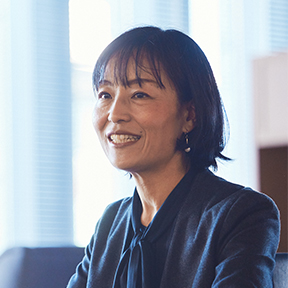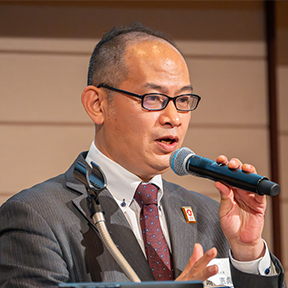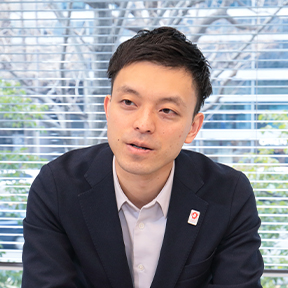2025.01.16

Good actions earn points toward Expo tickets and merchandise through new MYAKU-PO! app
Through Expo 2025 Osaka, Kansai, Japan , Mitsubishi Research Institute aims to make use of its Region Ring® digital regional currency services to help people take good actions aligned with the SDGs and resolve societal issues.
In July 2024, Mitsubishi Research Institute, Inc. (MRI) launched MYAKU-PO!, a rewards
program and accompanying app offered as part of the EXPO2025 Digital Wallet service.
The MYAKU-PO! program aims at building momentum for Expo 2025 Osaka, Kansai, Japan (Expo
2025) while at the same encouraging activities that contribute to achieving the Sustainable
Development Goals (SDGs). MYAKU-PO! users can earn points by participating in SDG-aligned
activities related to Expo 2025 events and themes, hopefully becoming more excited about the
upcoming Expo in the process.

Source: Mitsubishi Research Institute, Inc.
MRI senior researcher Masami Okada explains. “We learned from our previous pilot programs
that we could foster behavioral changes that match up with SDG initiatives by offering
reward points,” she says. “The nudge approach in behavioral economics is also part of it.
Hopefully we are giving people a small push to take more eco-friendly actions.”
The EXPO2025 Digital Wallet is an app service designed to promote cashless payments at Expo
2025 while also ramping up excitement in the lead-up to the event, publicizing its themes
related to digital technologies and actions for the future, and encouraging people to get
involved.
MYAKU-PO! points can be earned by using services offered by designated businesses and
organizations or by converting points gained through such services. They can also be earned
by participating in designated events or taking actions that contribute to achieving one or
more of the SDGs. The accumulated points can be redeemed for limited-edition Expo-related
merchandise, Expo 2025 admission tickets, or special experiences and services offered within
the Expo site.

Source: Resona Bank, Limited
Preceding this initiative, MRI entered into a business alliance with Resona Bank, Limited in
October 2023 regarding digital regional currency services based on MRI’s Region Ring
platform. Under the partnership, MRI implemented a premium voucher program for Wakayama City
in 2024. In addition, MRI and the bank have been advancing a digital wallet service in the
Osaka region, providing a package of services including a digital regional currency program,
vouchers, reward points, payroll services, and more.
Building on its promotion of MYAKU-PO! and track record for Region Ring, MRI intends to
accelerate its collaboration with Resona Bank in the Osaka region. Specifically, MRI will
expand the user base of the Osaka digital wallet initiative and explore the possibility of a
regional currency circulation system to help the region achieve sustainable development.
The Region Ring digital regional currency service is a platform for resolving regional issues in an integrated manner
MRI’s proprietary Region Ring, a digital regional currency service aimed at resolving
regional issues, constitutes the core of the series of initiatives.
Region Ring users can, on a single platform, manage and issue colored coins, which are
similar to Bitcoin but have additional features attached to them that allow them to be used
for such purposes as digital currency, e-money, reward points, and digital tickets. Region
Ring also offers a high level of security and can be adopted at a reasonable cost per region
or program. It can best be described as something similar to the QR code payment service.

Source: Mitsubishi Research Institute, Inc.
But why would a think tank like MRI engage in a digital regional currency service? Yoshinori
Saki, who is MRI’s General Manager, Expo 2025 Osaka, Kansai, Japan, explains. “We have been
working on Region Ring for around seven years, since our first pilot project in 2017,” he
observes. “It all started when an MRI researcher working on developing new businesses
realized that combining blockchain with AI and big data analysis could help in tackling
societal issues. The researcher then designed the service and promoted it. Our researchers
working on regional and urban development then joined in, and we started building up use
cases for triggering behavioral changes conducive to revitalizing regions and solving social
problems. MRI ended up renewing its guiding principles in 2020, which in turn called for us
to develop and implement innovative services by making use of the expertise we gained
through our research and consulting projects. The digital regional currency service uses
blockchain to fulfill the Expo 2025 philosophy. Our goal is to facilitate the circulation of
currency within our target regions, rather than making a service that reaches as far and
wide as possible.”
Region Ring is essentially a digital platform designed to resolve diverse regional issues in
an integrated manner. Its aim is to prompt regional actions to promote health, regional
revitalization, tourism, and SDG-related activities while also advancing digital
administration, supporting different ways of working, and addressing wide-ranging challenges
faced by regions.

Source: Mitsubishi Research Institute, Inc.
Today, Region Ring is increasingly used for regional currency services and premium regional
voucher programs aimed at attracting shoppers to local stores and boosting local
consumption. It is also being used for rewards and points programs that prompt SDG-aligned
and healthy behavioral changes among local residents and the issuing of welfare service
vouchers and gift certificates for young families and the elderly.
“We hope to use the Expo as an opportunity to try out different MYAKU-PO!-based nudges to
encourage behavioral changes among those in the general public who otherwise might struggle
to take action,” says Ms. Okada.
Putting ideas into action at Expo 2025
MRI is hoping to enhance its presence in the Kansai region through its Expo 2025
initiatives. Incidentally, MRI’s Kansai base was established in 1970, the year of Expo ’70
in Osaka as well as the founding year of MRI itself. Hence, the company’s history in the
Kansai region also spans more than 50 years. MRI has been working hard on the Expo 2025
project for almost four years. Harutoshi Imamura, MRI’s World Expo Office Leader, fills in
some details about the endeavor:
“We were even involved in the creation of the Master Plan for Expo 2025 Osaka, Kansai,
Japan. Our contract-based work as a think tank would usually end there, but this time around
we’re using the Expo as an opportunity to explore new business models. I myself am taking on
new challenges, creating videos and exhibition booths with creators and local
businesspeople. MRI is doing things that it would never have tried before. We are hoping to
make full use of Expo 2025 to put our ideas into practice and take a step forward.”
Expo 2025 is facing considerable criticism but, on the flip side, it provides companies with
a perfect opportunity to try out future-oriented services and technologies. What aspirations
does MRI have for Expo 2025? Mr. Saki’s answer is as follows:
“I hope that Expo 2025 will be a place of discovery for MRI. We have put our faith in the
opportunities offered by the Expo and became a sponsor. Since the start is six months away,
details about the pavilions are beginning to be revealed, and I’m clearly sensing a positive
shift in public sentiment toward the Expo.”
Answering before him, Mr. Imamura points out that it is “difficult to say what constitutes a
successful Expo.”
“When I went to the Dubai Expo and the Paris Olympics,” he continues, “the energy of both
the cities was palpable, and it was backed by the efforts of citizens to maintain their
city’s brand. The key is whether visitors will be impressed by the host city, even for a
split second. I truly hope that Osaka can successfully boost its own brand. A huge number of
people will come to Expo 2025 from around the world. I hope we can make the most of this
opportunity and enhance Osaka’s capacity as a city, thrusting it forward on the world stage
and bringing it closer to the position it envisions for itself.”
“The ideal is that visitors feel glad they came,” chimes in Ms. Okada. “I don’t want them to
be disappointed. I hope that the act of collecting MYAKU-PO! points will help them become
aware of actions that can be taken to help resolve societal issues. What I want is for each
visitor to have a memorable experience.”
INTERVIEWEES

Masami Okada
Senior Researcher

Yoshinori Saki
General Manager, Expo 2025 Osaka, Kansai, Japan

Harutoshi Imamura
World Expo Office Leader
Mitsubishi Research Institute, Inc.
2-10-3 Nagata-cho, Chiyoda-ku, Tokyo
Established 1970; JPY6,336.24 million in paid-up capital; Number of employees (as of
September 30, 2023): Consolidated: 4,428; Non-consolidated: 1,150
Mitsubishi Research Institute, Inc. is one of Japan’s foremost think tanks. For the
last 50 years, it has provided the public and private sectors with research and
consulting services in fields spanning energy, the environment, healthcare, human
resources, and digital transformation. This is accompanied by policy recommendations
and the real-world application of solutions. Mitsubishi Research Institute will
continue to envision the future, resolve societal issues, and lead change to build a
sustainable and prosperous world.


